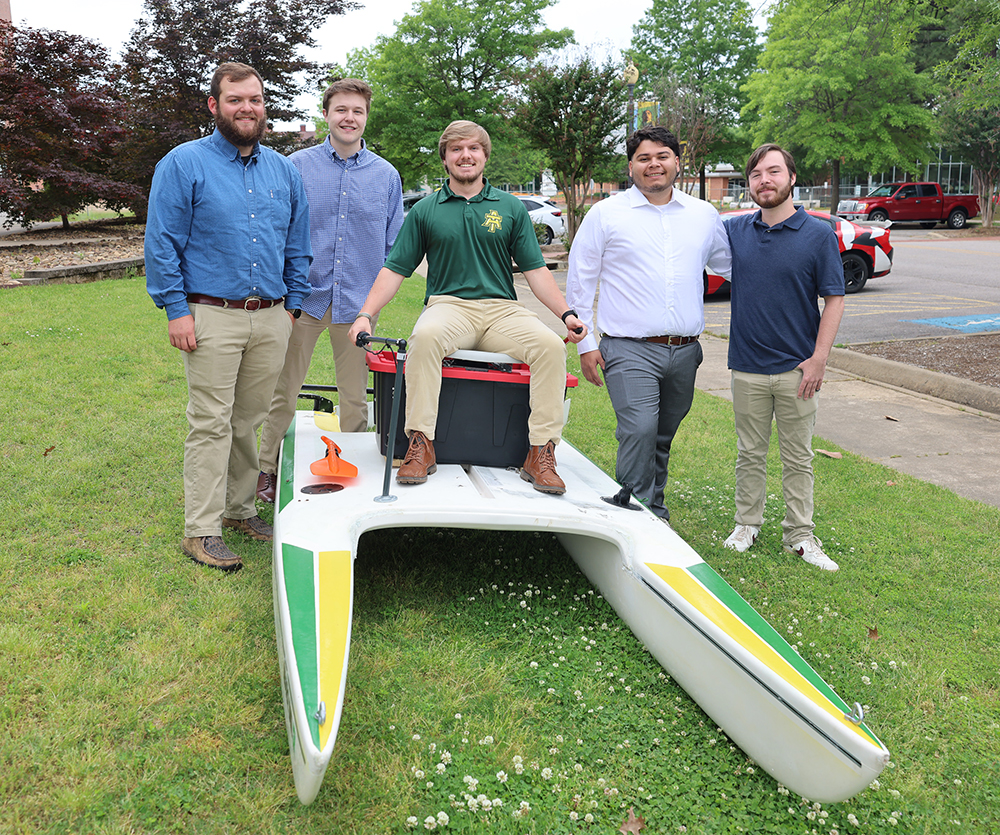
When it comes to designing, constructing and operating a boat that can run on battery power, a team of five engineering students from Arkansas Tech University can lay claim to the title rookies of the year.
In its first time sending a team to the competition, ATU finished second in the national Promoting Electric Propulsion boat races sponsored by the U.S. Navy Office of Naval Research and the American Society of Naval Engineers.
The competition took place in late April on Broad Bay in Virginia Beach, Va.
ATU was represented at the event by students Hector Campos of Hot Springs, Brad Fletcher of Hot Springs, Carter Manatt of Hot Springs, Johnathon Poindexter of Muldrow, Okla., and Quinn Reynolds of Monticello.
Dr. Mohammad Amjadi, ATU assistant professor of mechanical engineering, advises the group that represented Arkansas Tech in the competition.
The idea was born when Campos and Manatt put two different goals together.
“He (Manatt) wanted to do something with boats, and I wanted to do a race, so I Googled boat race for college students,” said Campos.
The goal of the project they discovered was to construct an electric-powered boat that could travel five miles in less than an hour. Campos took the lead on designing the motor and wiring. Poindexter was in charge of the battery. Fletcher oversaw the drive shaft. Reynolds served as a jack-of-all-trades during the design and construction process. Manatt was the boat operator.
Campos explained that one of the most important aspects of the project was safety.
“The trouble with water is it conducts electricity a little too well,” said Campos. “We had to make sure we had the right fuses in place and the right safety equipment. We had two kill switches, two fuses and we made everything as watertight as we could.”
Dr. Steve Russell, program officer from the U.S. Navy Sea Warfare and Weapons department, said the competition began six years ago and was inspired by a race conducted by hobbyists on Chesapeake Bay.
“The goal is to create a pipeline of graduating engineers who have worked on a suite of problems that are currently issues within the U.S. Navy,” said Russell in a news release from the U.S. Navy. “They come out of school after having designed and built a boat like this, and learning about high power electronics, propulsion, hull design, cooling and boat stability – the naval architecture parts of it. So far, we’ve hired many of them into the warfare centers and our industry partners.”
The 2024 competition featured 42 boats representing 35 universities and colleges. More than 200 students from across the United States participated. Princeton University, the University of Alabama and Texas A&M University were among the institutions represented.
“Everyone there was very friendly,” said Manatt. “We were all there to compete, but also to innovate the industry. Everyone was willing to help each other anyway they could. People don’t want to beat you when you’re down. They want to beat you at your best. If you beat someone when their boat doesn’t work, it doesn’t really mean much. But if you beat a boat when it is at its best, that’s where the competition really lies.”
Manatt said the U.S. Navy is looking at the competition as a means of identifying new technologies that can allow it to implement efficient, alternative solutions for short-term applications and small watercrafts.
With a second-place trophy at the Promoting Electric Propulsion boat races to its credit, Arkansas Tech is now a player in those conversations.
“We really didn’t expect to place that well with it being our first year to compete,” said Manatt. “We were going against some schools that had been there for four or five years. After the race, a lot of industry people and other universities were asking how long we’ve been doing this. When we told them it was our first year, everyone was blown away that we were able to put a boat together and compete that well.”
Visit www.atu.edu/engineering to learn more about educational opportunities in mechanical engineering, electrical engineering, computer engineering and nuclear technology at Arkansas Tech.





